Part 1 - Off like a train - Part
2 - The Jack Charlton affair - Results and
table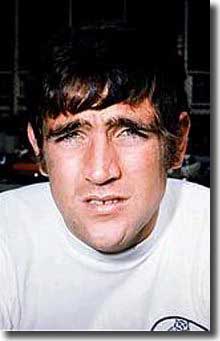
The 1969/70 season had not ended happily for
Leeds United, but the side had gone from strength to strength in the
new campaign, racing off to monopolise the League leadership in the autumn.
With just one defeat from their 24 games played, they held a three point
lead over second placed Arsenal at the turn of the year, with Chelsea
a distant ten points behind in third spot. United also had high hopes
in the FA Cup and Europe.
Life could hardly have been sweeter at the start of 1971.
The Whites had been drawn to meet Rotherham United of Division Three
in the Cup third round on 2 January, but, along with nine other ties,
the match was postponed because of frost and snow. It should have been
replayed during the week, but the pitch was still considered too dangerous
and was put off for a second time. The fixture at home to Tottenham on
9 January, therefore, was United's first action of the New Year.
Tom German in The Times: 'Leeds United have human weaknesses after
all. One begins to think of them as invulnerable when, week after week,
someone always seems to be around to cement over a colleague's error;
when someone from their array of talent invariably emerges to stamp his
name on the match. Tottenham Hotspur, taking their chances skillfully
to win 2-1 at Elland Road on Saturday, left the image a little blurred.
'In bare outline, two moments of wandering concentration in their own
half, coupled with neglect of their own scoring chances, led to Leeds'
first setback at home this season ... But there was much more to it than
that: Spurs scored while jerseys were still free of mud stains, were a
yard the faster for the first ten minutes and thereafter, though often
under pressure, had skill and determination enough to prevent Leeds drawing
themselves to full height.
'Spurs found openings, too, with the Leeds defence welding less effectively
than usual. Hunter, normally impregnable, made more mistakes in the first
few minutes than he has probably done all season. His feet became confusedly
entangled with the ball right at the start. Gilzean pounced to send Mullery
away down the right and, with Charlton having to move from the middle
to cover him, Chivers had a clear path for the opening goal. It was an
error by Giles, a misdirected pass meant for Bremner, which provided Tottenham's
winner 18 minutes from the end; Gilzean was there again to send Chivers
through.
'Each time it was Chivers' immaculate control and accurate aim which
made the most of the opportunity. Leeds were more fallible in similar
situations. Jones, sent galloping clear of the field, managed only to
run the ball straight at Jennings. The Yorkshiremen found several chances
going astray as they heaped on the pressure with Giles dropping a stream
of lobs into the goalmouth, hoping perhaps to exploit a difficult wind
and the absence of England's long reach.
'They had equalised, deservedly, in the 18th minute after shots from
Lorimer and Madeley recoiled from the barricade of Tottenham shirts. Bremner
lifted the final rebound gently on to the bar and Clarke, the most searching
Leeds forward, darted in to head over the line. The big assault was reserved
for the closing minutes.
'Bremner, only a couple of strides out, might have scored but Jennings
advanced to block him; Hunter found the ball coming at him awkwardly and
it bounced just wide of a post off his thigh; finally Bremner glanced
in a fine header to which Jennings reacted with a lightning leap to clutch
it against a post.'
Their unbeaten home record ended, two days later United finally faced
Rotherham in their restaged Cup-tie at Millmoor.
back to top
It should have been no contest, but the Millers had as much of the play
as their illustrious opponents and were well worth the goalless draw they
earned. As Terry Brindle wrote in the Yorkshire Post, "Leeds' reputation
cut no ice with confident Rotherham, who defended stoutly and attacked
with verve and élan throughout the match. Class will tell, we thought,
but Rotherham flatly refused to accept their supposed limitations. Willed
on by a wall of frantic support, Rotherham launched themselves headlong
at the Leeds defence and almost into the fourth round.
'Desperation or resilience lifted Leeds to a last magnificent onslaught
and Charlton had a header kicked off the line by the hard working Houghton.
But Rotherham were equally magnificent in their refusal to accept the
possibility of defeat. They held on superbly to earn a replay tomorrow
- and nobody would deny them their right to it.'
The match should have been replayed two nights later, but there was yet
another postponement, this time due to fog.
United returned to winning form at West Ham at the weekend, emerging
with a 3-2 win, though they required a late rally. After cruising into
a 2-0 lead with goals from Hunter and Giles and dominating the game, United
conceded goals in the 80th and 83rd minutes to find themselves caught.
Two minutes later, Belfitt, a substitute for Jones, got the winner that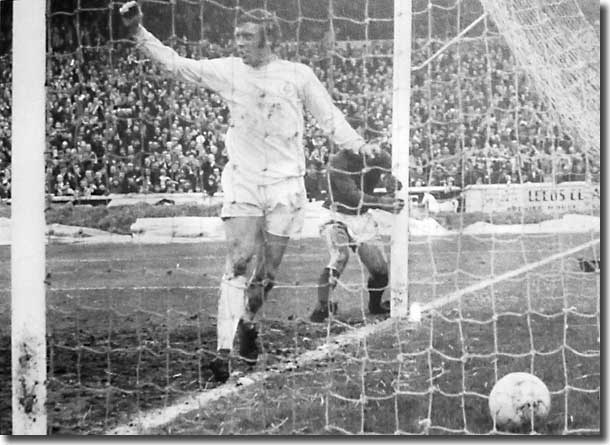 Leeds fully deserved.
Leeds fully deserved.
It was then back to their marathon with Rotherham, on a bitterly cold
evening with heavy rain making for an uncomfortable night at Elland Road.
Eric Todd in The Guardian: 'The absence of Jones with a thigh
injury and the departure of Cooper after seventeen minutes with a similar
complaint embarrassed Leeds, who in the first half already had enough
on their plate with the wind and a very determined Rotherham side. Leeds
made more mistakes than they are expected to make in a whole month and
if it had not been for the magnificent work of Madeley, Hunter and Reaney
they certainly would have been in serious trouble. Their attacks were
almost non existent and although Leeds did take the lead, they were behind
at half time and looking thoroughly depressed and embarrassed.'
United took the lead after 27 minutes through Lorimer. The chance was
manufactured by some smart play by Clarke and a neat pass under pressure.
Rotherham equalised five minutes later. Goalkeeper Ray Tunks' long clearance
was caught by the strong wind and carried over Hunter's head. Trevor Womble
got possession, evaded Hunter and fired convincingly past Sprake. The
United keeper surrendered a second goal three minutes later when he spilled
Fantham's cross with Womble and Charlton crowding him, and Bentley scored
easily.
United managed to exert a degree of control in the second half. After
56 minutes, Clarke flicked on Reaney's cross for Lorimer to make it 2-2.
Six minutes later, Giles earned the lead with a low shot that took a deflection
off a defender.
It was a fractious affair with referee Jim Finney calling the captains
together in the second half to demand restraint after Charlton had been
tackled hard by Womble and got his revenge, violently charging the forward
to the ground.
Relieved to have escaped unscathed, United had little problem overturning
Swindon in the fourth round five days later. Mick Jones snaffled a hat
trick, his first goals since November, and Clarke another as Town were
trounced 4-0.
John Arlott in The Guardian: 'A clearly planned and coolly executed
operation produced the predictable result in a match of diverting skills
but no surprises ... Leeds United simply confirmed their power; this is
what it is like to be the team the bookmakers expect to win the Cup. Swindon
went through all the motions of earning their money; they hurried like
mad, but Leeds, who did not, were always faster.'
They followed up with an impressive 2-0 victory at Manchester City, previously
third in the table though ten points behind United. The goals came from
Clarke and Charlton, while Manchester City manager Joe Mercer complained,
'Gary Sprake dropped more balls than Colin Cowdrey and got away with it.'
During the week that followed, it was revealed that reserve goalkeeper
David Harvey had been placed on the transfer list at his own request.
Don Revie: 'I have done everything
in my power to keep David here but he has obviously reached the stage
when he wants regular first-team football.' Harvey had been at Elland
Road since 1965 but had always been second choice to Gary Sprake, making
less than 50 first-team appearances in that time. Revie promised that
Harvey would not leave until a replacement had been signed.
Leeds hosted Liverpool on 6 February and gave young Chris Galvin a first
start of the season at No 11, with Paul Madeley deputising at centre-half
for Jack Charlton. During the win
at City, the defender had sustained further damage to a nose broken during
the Rotherham games. Bremner was still missing with an injured ankle.
back to top
Liverpool were in the midst of rebuilding with manager Bill Shankly bringing
through youth at the expense of the old stagers who had served him so
well in the Sixties. By their standards they were having an average season,
sitting in eighth position and already beaten on five occasions. But they
could usually be relied on to raise their game for the big matches.
The Reds enjoyed early fortune when referee Clive Thomas missed Phil
Boersma handling the ball as he began the move which led to Liverpool's
second minute goal. Sprake fumbled Boersma's shot, though he argued he
was hindered by Paul Reaney. Liverpool's £110,000 signing from Cardiff,
John Toshack, accepted the gift and shot in off Hunter.
The visitors then set up the sort of defence in depth that had always
been United's trademark and, coupled with some refereeing that had the
home fans complaining of favouritism, they denied Leeds all but the faintest
chinks of light.
Madeley did get the ball past goalkeeper Ray Clemence after 48 minutes,
but the effort was disallowed for a petulant foul by Clarke on Tommy Smith.
Liverpool were always dangerous on the break: Steve Heighway hit the woodwork
with one shot and then saw another beat Sprake only to be cleared off
the line by Terry Yorath, a second half substitute for Galvin.
Barry Foster of the I blamed the defeat on the absence of Madeley in
midfield: '"You cannot expect to recover after a quick goal against
a side like that, especially without Big Jack and Bremner,£ said
the disappointed Leeds United supporter as the 48,000 crowd left Elland
Road in Saturday. There may be something in that. Leeds could have done
with both their injured half-backs ... Without Charlton, Leeds had Madeley
at centre-half and so lost the strength and calmness of this versatile
player in midfield. Just how important he has been in the three pronged
partnership with Giles and Bates in the past few weeks was laid bare for
all to see when he was no longer there.'
For the fans, the focus lay on Sprake's error, as reported by Don Warters
for the Yorkshire Evening Post: 'Don Revie - although disappointed
as anyone at the latest setback in the League title race - is more concerned
with the actions of some of United's so-called fans for the treatment
they gave Gary Sprake during Saturday's match. Sprake, blamed over the
weekend for United's 1-0 defeat by Liverpool after losing the ball when
Reaney ran into him ... is still tops for Mr Revie.'
Whatever the level of support he offered publicly, Revie had private
doubts about his goalkeeper, who had cost United a point when spilling
an easy catch at Crystal Palace in November. However, the manager opted
for a very public show of faith, naming him again for what looked to be
a straightforward FA Cup fifth round tie at Fourth Division Colchester.
It turned out to be one of the blackest
days in United's history, as they tumbled out in one of the tournament's
greatest ever upsets.
Veteran former England striker Ray Crawford scored twice and Dave Simmons
added a third before United got their game together sufficiently to threaten
a comeback with goals from Hunter and Giles, but they could not conjure
up an equaliser.
Revie said after the game, "Our job, starting with normal training today,
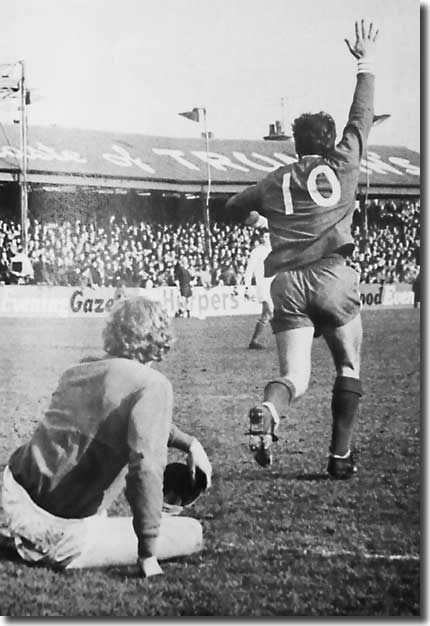 is
to pick ourselves up and win the League and the Fairs Cup. I am not holding
an inquest today. That will come later in the week, when we are analysing
Wolves before we play them here on Saturday ... I am trying to restore
normality and I am quite sure my players are able to achieve it."
is
to pick ourselves up and win the League and the Fairs Cup. I am not holding
an inquest today. That will come later in the week, when we are analysing
Wolves before we play them here on Saturday ... I am trying to restore
normality and I am quite sure my players are able to achieve it."
back to top
Inside, Revie was absolutely fuming. His team still had a three point
lead over Arsenal in the League, but they had thrown away a great chance
in the Cup and the home defeats to Tottenham and Liverpool rankled sorely.
The manager was insistent that the players should put matters right a
week later when they hosted Wolves. Gary Sprake was a notable absentee,
with rumours that he had been dropped, though it was later revealed that
he had badly gashed his hand during some competitive training sessions
during the week.
The injury allowed Revie to give David Harvey an opportunity, hoping
that the move might lead to the keeper changing his mind about leaving
Elland Road.
Geoffrey Green reported the Wolves match for The Times: 'In the
end it was easy enough; a 3-0 victory in the bag. But for over an hour
on Saturday there was an edgy, uncomfortable look about Leeds United as
they strained to rehabilitate themselves in their own eyes and in those
of a 37,000 crowd at Elland Road, which braved grey squalls of rain hurrying
over the Pennines. At that point on the clock there was only the slender
difference of a neatly headed early goal by Clarke between themselves
and Wolverhampton Wanderers, who had pushed themselves up the League into
fourth position. News from afar, too, had it that Arsenal, breathing down
their necks in the race for the championship, were already three up at
Highbury.
'Perhaps it was just imagination. But what with this and other things,
Leeds, for a long time, seemed to be cocking an apprehensive ear as if
still catching the painful echoes of some distant drumbeat from Colchester's
garrison.
'But, as I say, finally it was all right. With 25 minutes to go Cooper
at last put Madeley through for a fine second goal and almost at once
Giles wrapped it up from the penalty spot with a third, after Shaw had
hooked up the aggressive Cooper and got his name taken into the bargain.
Leeds took a comforting deep breath and in the dying moments almost doubled
their score with an obvious relish. Remarkable to say these were Leeds'
first points at home since the New Year.
'Yet I doubt if they will recover their eminent peak until the return
of the injured Bremner in midfield and Gray to the left flank of attack.
This is no disparagement of their understudies and of Bates in particular,
who with Madeley, that efficient all rounder, was now always at little
Giles' shoulder helping to carry the battle to an uncompromising foe.
Bremner, however, possesses the special quality necessary to Leeds in
general and to Giles in particular - a certain empathy that has grown
with the seasons. Without him Giles - for all his astute switching of
the point of approach and the long crossfield pass to Cooper, which now
brought width to attack - at present resembles a man who has lost an arm.
'Gray, too, his broken ankle just out of plaster and crutches at last
put aside, is needed once more for his ability to penetrate the opposition
with close dribbling.
'The Arsenal chairman, Mr Denis Hill-Wood, has recently said that Leeds
"are creaking like a rusty gate", but for seven years now the
Yorkshire club have been in at the finish of one competition or another
and they will be so again this spring. Leeds have now started their run
in over the last third of the League fixtures and at a pinch could surpass
their own record total of 67 points achieved
in 1969. It will take some doing, but with Arsenal yet to visit Elland
Road ... Leeds, as front-runners, should still be able to dictate the
pace over the final stages.'
Bremner was back for Tuesday evening's match at struggling Ipswich, but
only lasted 25 minutes of his first game in six. He suffered a calf injury
in a second minute tangle with Allan Clarke's older brother Frank. By
the time the Scot had been withdrawn to be replaced by Rod
Belfitt, Ipswich were already 2-0 ahead and troubling Leeds. According
to David Lacey in The Guardian, United 'appeared to have no answer
to the forward dashes of Woods, the purpose of Viljoen, and the continuous
probing of their flanks by Mills and Robertson, whose corners led to each
of Ipswich's goals'.
The first came in the fourth minute when Jack Charlton couldn't control
a bouncing ball and mistimed his clearance. Mick Hill rose above Charlton
to nod home the corner. After 25 minutes, Harvey failed to gather Robertson's
flag kick and Viljoen fired it low through a forest of legs and into the
net. Clarke pulled back a goal just before the half hour, slipping the
ball past keeper Sivell. Even this early, it seemed mere consolation and
Leeds went in at the break still behind.
After the resumption they were a changed team: with just two minutes
gone Lorimer equalised after a Jones ball across the face of goal; another
four minutes and Clarke ghosted past the defence down the left to beat
Sivell's despairing attempt at a save; and then in the 64th minute Leeds
were two goals clear when Giles converted a penalty awarded when Hammond
pulled back Belfitt. It was a breathtaking revival.
Again, there was speculation that the early problems had been down to
Madeley's absence from midfield, this time covering for Reaney, missing
with a bruised toe, but United proved in the second period they could
cope without him at their heart.
back to top
A Lorimer goal was enough to secure victory at Coventry on Friday, 26
February, and take United seven points clear of Arsenal, though the Gunners
now had three games in hand. They squandered one of those opportunities
the next day, losing 2-0 at Derby. Don Revie would only say, tight lipped,
'No forecasts. I'll believe we've won the championship only when I see
Billy Bremner get his hands on the trophy ... We shall continue to take
each game as it comes and try to forget all about Arsenal.'
United's squad was struck by a flu outbreak during the following week
with seven players (Madeley, Lorimer, Bates, Hunter, Hibbitt,
Davey and Galvin) suffering and three
others, Bremner, Gray and Cooper, injured. The club attempted to get their
match with Derby County postponed. The League rejected the application
and United were forced to play, with Davey, Bates, Madeley, Lorimer and
Hunter in the side, though Clarke was missing.
It was a tight game, with no score until the final 15 minutes, when Jones
set Lorimer up in the box. The Scot evaded a crashing tackle from Dave
Mackay to beat goalkeeper Colin Boulton and settle the contest.
European action resumed on 10 March with Portugal's Vitoria Setubal visiting
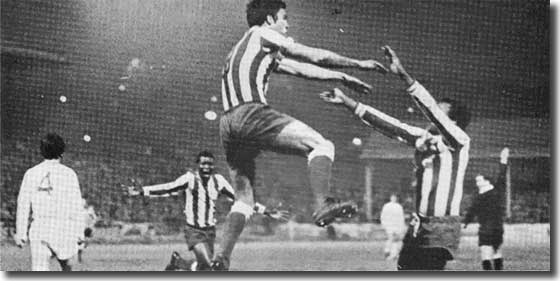 Elland
Road. David Harvey kept the goalkeeper's jersey, despite the availability
of Gary Sprake, who was named among the substitutes, along with young
Scottish striker Joe Jordan. Cooper, Bremner, Clarke and Gray were all
unavailable.
Elland
Road. David Harvey kept the goalkeeper's jersey, despite the availability
of Gary Sprake, who was named among the substitutes, along with young
Scottish striker Joe Jordan. Cooper, Bremner, Clarke and Gray were all
unavailable.
The game started with a shock, as Baptista scored for Setubal within
90 seconds, diving horizontally to head home powerfully from a low cross
by Guerriro.
United recovered to take control of the game, though it was a tight and
competitive affair with 19 free kicks awarded in the first half hour.
Leeds did most of the attacking but found the agile and spectacular Torres
in Setubal's goal a formidable barrier to their intentions.
They did manage two goals, both coming from dead balls. After 19 minutes,
they were awarded a free kick for a foul on Jones. Lorimer equalised with
his fourth goal in as many games, firing in a power drive from 20 yards
that Torres had no chance of stopping.
The free kick had been hotly disputed, but the protests were as nothing
to those which followed the award of a penalty with 15 minutes remaining.
East German referee Gunter Mannig decided that Cardono had handled the
ball, but he was swiftly set upon by a mob of furious Setubal players,
berating him and waving their arms about excitedly. He raced away with
the horde at his heels and the Portuguese management fiercely protesting
from the sidelines. Mannig disappeared from view under the masses for
about three minutes. Phil Brown in the Evening Post: 'The referee
was so surrounded and so badgered he forcibly broke to the edge of the
box. He was besieged there, too, so he broke for the penalty spot, again
hunted in what resembled a conga-style chase, and took his stance there
till Giles got ready for the kick, all amid uproar round the ground.'
Order was restored when police moved in to restrain the anger in the
trainers' box, but that didn't prevent the home supporters bombarding
the Portuguese with missiles.
When play was restarted, Giles shot home calmly from the spot, though
Torres got his hand to the ball.
Phil Brown in the Evening Post: 'United were up against one of
Europe's best goalkeepers in Torres, who was in simply superb form behind
his well-drilled defence. He was a one man wall in himself - with the
hallmark of a class player he made difficult saves look easy. As Don Revie
said: 'He was as good as Sprake in Budapest and at Liege.' I think only
Giles of all the penalty kings in Europe could have beaten him from the
spot, and even he only just got the ball home for Torres had read his
run up and just missed saving with an electrically fast dive for a six
footer to the foot of his right hand post.'
back to top
As if exhausted by the excitement, United dropped a point on 13 March
after allowing relegation-haunted Blackpool to take a first half lead
at Bloomfield Road. Lorimer equalised in the first minute of the second
period though the Seasiders protested that he had been offside. Referee
Jim Finney decided a defender had played the Scot onside. The decision
went the other way when Clarke's goal in injury time was chalked off for
offside against him.
Arsenal had narrowed the gap at the top to six points by winning 2-0
at Crystal Palace and on the journey back to Leeds, Don Revie sought to
lift spirits by giving the players a glass of champagne each to celebrate
his ten years in charge at Elland Road. There was more bad news, however,
with the revelation that Billy Bremner's injury, which had been thought
to be a calf muscle, was actually a hairline fracture of the left leg.
Revie: 'It will mean Billy being out of action a little longer than we
originally thought, but I'm certain he will be back to lead the side in
the final run in. I admit it has been worrying having to do without a
player of his class for so long this year. I want to emphasise that it
is a very, very slight hairline fracture. It is not a broken leg and all
being well Billy will be able to play again a 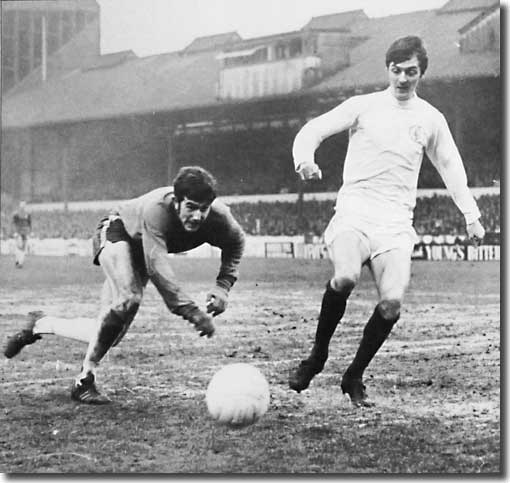 week
on Saturday.'
week
on Saturday.'
That was over-optimistic and Bremner and Eddie Gray would both be missing
for another four weeks.
The top two's fixtures were reversed the following weekend, with Leeds
hosting Palace and Arsenal at home to Blackpool. United once more had
to come from behind to win 2-1 with efforts from Giles and Lorimer (his
sixth straight scoring game), while the Gunners beat Blackpool by a single
goal.
Midweek brought a trip to the sun with the decisive second leg against
Setubal. United gave a satisfactory performance in what was expected to
be a difficult match after the passion of the first leg.
They weathered an early storm when Paul Reaney headed a cross against
his own woodwork, but came back impressively. Jones shot against an upright
in the sixth minute and Leeds settled into some composed football before
deservedly taking the lead after 17 minutes when Lorimer was on the mark
again, putting the ball between the keeper's legs with a soft effort.
It was the seventh successive match in which he had scored. Clarke struck
the crossbar and Charlton had a shot cleared off the line before Jones
had a goal disallowed for offside as United played a classic counter attacking
game.
The second half began with pressure on the United goal. Harvey was bundled
over his line with the ball by two opponents. The referee rightly disallowed
the goal and took the name of Baptista.
In the closing minutes Hunter cleared off the line and then Harvey was
carried off with damaged knee ligaments. Sprake's first task after coming
on to replace the keeper was to pick the ball out of the net from Baptista's
header. Later he was to make an excellent save from the same player to
secure the draw Leeds needed to progress into the last four.
Their return to the UK brought only a disappointing 3-1 defeat at Chelsea
on 27 March. The Whites remained six points clear of Arsenal, who drew
with Stoke City in the FA Cup semi final, but the Gunners had three matches
in hand.
United came back with a strong performance in the next game and Allan
Clarke grabbed all four goals in a 4-0 defeat of Burnley. Arsenal beat
Chelsea 2-0 the same day and the following Tuesday saw off Coventry by
a single goal.
A week later Leeds came back from a goal down at Newcastle to earn a
1-1 draw with a Lorimer goal direct from a corner. Arsenal's 2-1 victory
at Southampton brought the lead down to a mere three points and the Gunners
still had two games in hand.
Two days later, on Easter Monday, Leeds dropped another point when drawing
0-0 at Huddersfield. The Times: 'Leeds United failed to find their
best football touches in their own back yard last night ... Only fitfully
did the maestro Giles weave his patterns. To United's credit, however,
they did not panic when they lost their incisive right winger Lorimer
within eight minutes of the start. The Scot went down after a strong challenge
from Hutt, the Huddersfield left-back, with a finality that ensured the
early committal of Belfitt, the Leeds substitute, to the fray. Lorimer
may miss the remainder of his club's games this season. He was withdrawn
early in the first half with a pulled hamstring. The injury is considered
serious.'
back to top
Arsenal duly narrowed the gap to two points the following day by winning
3-0 at Nottingham Forest.
The momentum was clearly with the Gunners. Geoffrey Green in The Times:
'Easter, invariably, has a sting in its tail. So it proved again as Arsenal,
completing their second successive away victory of the holiday, moved
remorselessly close the heels of Leeds United in their bid for the League
and Cup double. Two goals in the opening half by the 19-year-old Kennedy
and another later by George clinched another efficient performance with
a 3-0 win on the Nottingham Forest ground. Arsenal are only two points
behind Leeds with two games in hand and a superior goal average. Everything,
it might seem, hangs on the meeting of these two sides at Elland Road
on 26 April. Arsenal, perhaps rightly, can say that they are in a position
to lose that and take the title providing they keep pace with Leeds in
all the remaining matches.'
When United visited Anfield to meet
Liverpool in the first leg of their Fairs Cup semi final pairing on 14
April, Don Revie was able to recall his talisman, skipper Billy Bremner.
The Scot did the trick with a second half header to settle a tense affair
and give Leeds a massive advantage.
The Yorkshiremen's game with West Bromwich
Albion at Elland Road on 17 April seemed a formality, but a perverse
refereeing decision by Ray Tinkler contributed to Albion's controversial
2-1 victory. He waved play on with Colin Suggett miles offside and Tony
Brown took the ball on to set up a goal for Jeff Astle. With Arsenal beating
Newcastle at Highbury by a single goal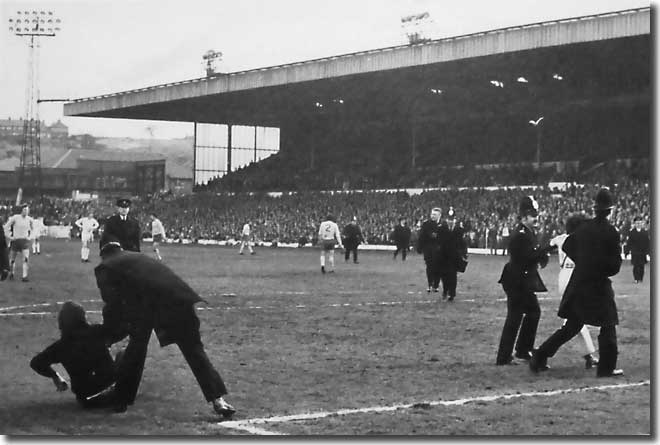 from Charlie George, the Gunners now topped the table on goal average
and had played two games less than Leeds.
from Charlie George, the Gunners now topped the table on goal average
and had played two games less than Leeds.
Don Revie was furious with Tinkler's performance, saying, 'I have never
felt so sick in all my life in football,' but promised that, 'We shall
keep fighting to the last gasp.'
Arsenal continued to prosper with a single goal victory at home to Burnley
on 20 April, but they could only draw 2-2 at Albion the following Saturday,
giving United the chance to close the gap to a single point by winning
3-0 at Southampton.
Geoffrey Green in The Times: 'Here was a rounded, thoroughly polished
performance by Leeds, more impressive and inventive than when Arsenal
beat Southampton 2-1 on the same tight little ground a fortnight ago.
With Bremner and Gray back in the Yorkshire ranks the feeling grew that
Leeds ... may still find a final freshening breeze to get them to port
while Arsenal, sensing the various thorny pressures, may begin to lose
some of their powerful impetus.
'The final arbiter may be those damned dots of goal average. Which made
it all the more puzzling that Leeds did not press more hungrily for goals
over the last stages on Saturday. With Southampton dangling from a rope
Bremner, Giles and company seemed content to play possession football
in their own waltz time while what they needed was to put the ball firmly
in the net. Only a couple of minutes remained when Jones completed the
scoring with his own second and his side's third goal - a shot that may
prove of considerable value.
'Those were the first ;eague goals scored by Jones since October and
they could scarcely have come at a better moment; on his 26th birthday.
Had Clarke's finishing been sharper before he retired with a strain ten
minutes from the end Leeds would have smiled even more broadly than when
luck opened the gates for them on the stroke of half-time.
'As Clarke mishit a soft shot past Martin, after a move between Cooper
and Gray down the left, there was Hollywood, with instinctive covering,
to save inside the far post. But in trying to flick the ball to his surprised
goalkeeper he turned it gently and tragically over his own line. He resembled
the guardsman who dropped his rifle on parade.
'Until then a fine fluid battle had stood delicately poised. In a trice
it was over. Within three minutes the elusive Gray destroyed Kirkup with
footwork and body swerve, pushed the ball into the left byline, and Jones
hit the target from close range. Within seconds came the interval and
the news that Arsenal were 1-1.
'Here for a blessed change was a game of wingers : 4-2-4 matching 4-2-4
as the flanks were used freely. Gray left his indelible mark by opening
up the wing again like a corkscrew to present Jones with a final goal
and make it clear how much Leeds have been missing him since December.'
back to top
Now, United had the perfect opportunity to halt the Gunners' seemingly
irresistible charge to the title. They
hosted their rivals the following Monday in a vital clash: if Leeds
lost, Arsenal would be home and dry, three points clear and uncatchable.
A draw would take them almost there so victory was essential for United.
It was every bit as tight and tense an occasion as the circumstances
suggested and the two gallant sides were locked in stalemate for almost
the entire evening.
In the closing minutes, though, Charlton forced home the ball. The Arsenal
players protested long and hard that he had been offside, but to no avail.
For once, United had the luck and referee Burtenshaw was every bit as
unequivocal as Tinkler had been the week before.
United had beaten their fierce rivals to move a point clear. They would
still need to rely on Arsenal dropping points, as they had a game in hand,
but they had at 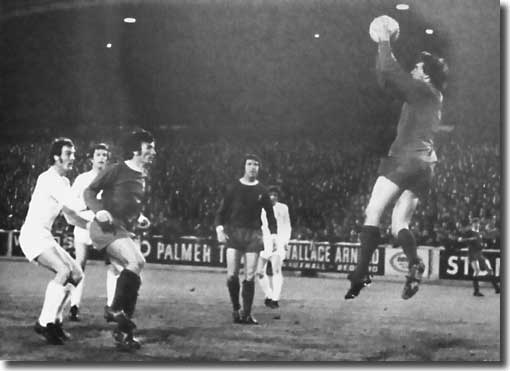 least
given themselves a decent shout of success when all seemed lost.
least
given themselves a decent shout of success when all seemed lost.
But that would have to wait a few days, for first Leeds had the challenge
of finishing off the job they had started against Liverpool in the Fairs
Cup.
The second leg of the semi-final came at Elland Road just two days after
the Arsenal match, but Don Revie nominated the same starting eleven, confident
they could protect the single goal advantage given them by Bremner.
There were to be no heroics this time as the Whites opted for safety
first tactics. Don Warters in the Yorkshire Evening Post: 'A crowd
of 40,462 gave United a tremendous reception when they took the field
only 48 hours after that outstanding effort against Arsenal ... and the
players responded with another of their great team efforts, every man
playing his part to the full. Against Liverpool's freshness ... it was
understandable that United wanted to avoid a hammer and tongs battle and
they paced the game, particularly in the first 45 minutes, to their liking.
'United's vast experience ... again served them well, although I found
Liverpool's first half tactics surprising. They operated basically a 4-4-2
formation, with Heighway and Toshack their trump cards up front, when
they might have been expected to concentrate on attack. But to be fair
to Liverpool, United played exceptionally well, and their defence was
as solid looking as it has been all season. Gary Sprake illustrated once
again that the difficult days of not so long ago are behind him, performing
admirably in United's goal. He dealt competently with Liverpool's three
efforts of note in the first half. Two were from Heighway, and one of
them Sprake fingertipped behind to make the best save of the night, although
Glasgow referee Tiny Tom Wharton robbed him of some of the glory by giving
a goal kick.
'At the other end, Mick Jones almost increased United's lead in the 26th
minute with a powerful and well-placed header. Clemence pushed the ball
up on to the crossbar and was thankful to see it hooked away by Hughes.
'With Allan Clarke and Mick Jones, who both got leg injuries, absent
in the second half, Clarke for the whole of it and Jones for all but eight
minutes of it, Paul Reaney and Joe Jordan came on as Liverpool began to
pile on the pressure. But Leeds fell back and soaked up what Liverpool
threw at them. With Charlton a commanding figure and Hunter, Cooper, Madeley
and Bates supporting him to the full, Leeds were on their way to the final
long before the end.'
Leeds closed their League campaign with a 2-0 victory at home to Nottingham
Forest thanks to goals from Bremner and Lorimer. They should have had
a bagful and that would have considerably helped their goal average, but
as it was their fourth game in eight working days, few could wonder that
they did not push on too forcefully.
Arsenal matched them point for point with a single goal victory at home
to Stoke City and the die was now cast - the Gunners were a point behind,
but had one game remaining, two days later away to North London rivals
Tottenham. A win or a goalless draw would be enough for them to secure
the title. A Spurs victory or a draw by any other scoreline would see
the championship in Yorkshire hands.
It was a tense affair at White Hart Lane with Tottenham keen to block
their neighbours' progress. For most of the night, despite all of Arsenal's
fierce attacking passion, it seemed that the match would end in a barren
stalemate, but with two minutes left Ray Kennedy rose to head the ball
past goalkeeper Pat Jennings and settle the affair - Arsenal were champions.
United received the news in Hull where they were playing a testimonial
match for the Tigers' Chris Chilton and could only bemoan what might have
been. Don Revie graciously despatched telegrams of congratulation, saying
with sad resignation, 'We are naturally disappointed having scored 64
points. We have not lost the title, they have won it. They are true champions
and that is what I have said in the telegram. It would be all too easy
to sit down and weep, but that would not alter anything at all. We have
simply got to start again. We still have the European Fairs Cup final
and after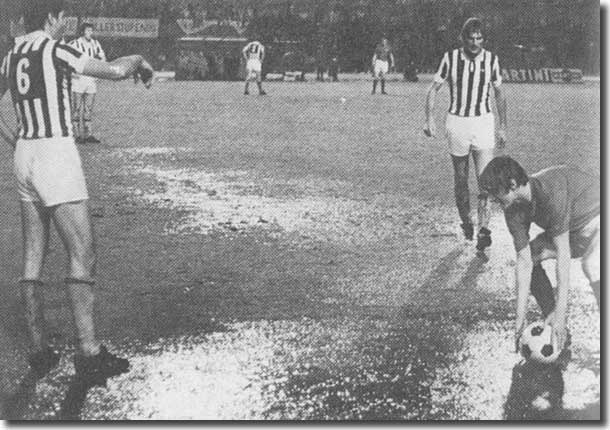 that it won't be long before we are preparing for another season. Any
team that wins nine out of its last eleven matches at a time when the
FA Cup final was on their minds are true champions.'
that it won't be long before we are preparing for another season. Any
team that wins nine out of its last eleven matches at a time when the
FA Cup final was on their minds are true champions.'
It was to be almost a month before United were back in action, in their
attempt to beat Juventus and win the Fairs Cup; a number of players kept
their hands in with duty for their countries in the Home Internationals.
Madeley (making a long-awaited England debut), Cooper, Clarke, Bremner,
Gray, Lorimer, Sprake and Yorath were the men in question.
back to top
The United party flew out to Turin for the
first leg of the Fairs final in the last week of May knowing that
whoever won the trophy in its final staging before it was replaced by
the UEFA Cup, would get the opportunity to play the first winners, Barcelona,
in a match to decide permanent ownership.
The first attempt to play the match, on Wednesday 26 May, was ruined
by heavy rain rendering the pitch unplayable, though they got to half
time before the match was abandoned.
It looked as if the terrible weather might lead to both legs being played
in Leeds, but eventually the skies cleared and the match was restaged
at the Stadio Communale on the Friday evening.
Juventus twice took the lead before being pegged back, first by a goal
from Paul Madeley and then by one from the unsung Mick Bates, who had
enjoyed a memorable campaign, his best yet in the colours of United.
The 2-2 draw gave Leeds a clear advantage for the
second leg at Elland Road a week later, though the Italians had shown
themselves to be an outstanding team.
Allan Clarke gave Leeds an early lead with a sharp piece of finishing,
but Pietro Anastasi soon brought Juve level.
United were cagey thereafter, comfortable in the knowledge that if the
score remained as it was they would secure the trophy on the away goals
rule. The Italians were also cautious and there were no more goals.
One could feel sympathy for Juventus, who went through the entire competition
undefeated, but few people would begrudge United their moment of glory
after years of near misses and two seasons without a major trophy. They
fully deserved their success, sustaining their remarkable record of consistency
in the competition.
They had played 54 Fairs Cup matches over six years and five attempts
on the trophy; they had won it twice, been beaten finalists once and lost
in the semi final on another occasion.
Rob Bagchi and Paul Rogerson in The Unforgiven: 'This second Fairs
Cup was Leeds' fourth trophy in four seasons. They became the first and
only British team to win the trophy twice. It was a commendable record,
but still the air of disappointment lingered. While the victory was celebrated,
expectations had grown considerably and it seemed scant reward for everyone's
efforts over the last two seasons. Now almost all the players agree that
they should have won more. They always worked diligently to ensure that
the club was unfailingly in pole position each spring, but more often
than not they fell short of the target Revie set them at the start of
each campaign. The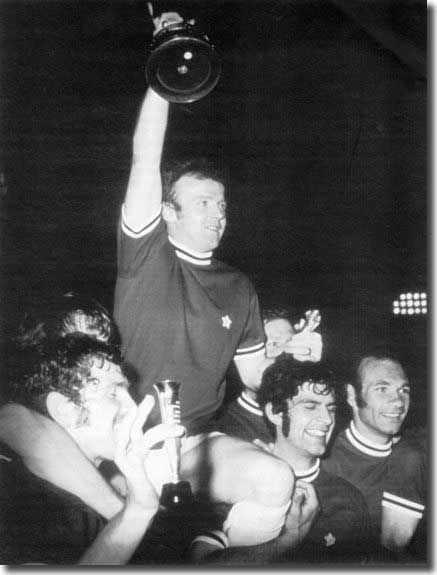 European Cup was Revie's ultimate goal, and to win it they had first to
qualify, which meant securing a second League title. Anything else would
be gratefully received but it would still be second best. Of course, after
two unsuccessful final appearances, the FA Cup still tantalised the whole
club, but coming second again in the championship race remained the bigger
blow to Revie's ambitions. He knew his team's appetite had not diminished
and was convinced that their dreadful luck with Tinkler's perverse performance
was the main reason why his dream had imploded. Next season, he resolved,
would be different. Next season they would not allow themselves to become
hostages to the arbitrary rulings of a willful referee. If Arsenal could
win the double, he calculated, then so could Leeds.'
European Cup was Revie's ultimate goal, and to win it they had first to
qualify, which meant securing a second League title. Anything else would
be gratefully received but it would still be second best. Of course, after
two unsuccessful final appearances, the FA Cup still tantalised the whole
club, but coming second again in the championship race remained the bigger
blow to Revie's ambitions. He knew his team's appetite had not diminished
and was convinced that their dreadful luck with Tinkler's perverse performance
was the main reason why his dream had imploded. Next season, he resolved,
would be different. Next season they would not allow themselves to become
hostages to the arbitrary rulings of a willful referee. If Arsenal could
win the double, he calculated, then so could Leeds.'
Part 1 - Off like a train - Part
2 - The Jack Charlton affair - Results and
table
Other Football Highlights from 1970/71
- The times were a-changing for many of the players who had graced football
for the last decade. Sir Alf Ramsey left out the Charlton brothers and
Gordon Banks from his England squad when beating East Germany 3-1 in
November. Banks returned later, but it was the end for the Charltons.
Two other England stars decided to retire, the former captain, Blackpool
full-ack Jimmy Armfield and Jimmy Greaves, who became only the fourth
person to score more than 350 goals in the league
- Ted Macdougall scored 49 goals in the season for Bournemouth, with
six coming in an FA Cup first round replay against Oxford City
- Trevor Francis was a new star. The 16-year-old was in his first season
at Birmingham and hit 12 goals in 8 league matches
- Arsenal became the second club this century to win the league and
Cup Double
- Bobby Moore's thunderous clearance for West Ham on 14 November scored
a direct hit on the referee and knocked him out. Moore promptly took
the referee's' whistle and blew it to stop the game
- Chelsea became the third London side and England's fourth to win the
Cup Winners' Cup when they beat Real Madrid 2-1 in Athens on 19 May
- The worst sporting disaster in Britain cast a pall over the New Year's
celebrations in Scotland. 80,000 were at Ibrox to witness the traditional
Old Firm match between Celtic and Rangers. Celtic were winning 1-0 with
a few minutes remaining and spectators were starting to leave. Colin
Stein scored a late equaliser and the departing fans rushed back to
watch, leading to a barrier collapse and 66 deaths
- Goalkeeper Peter Bonetti made his 500th appearance for Chelsea on
23 January
- Derek Dougan, the Wolves striker, was elected chairman of the PFA
- For a sixth successive season Celtic won the Scottish league. They
also won the Scottish Cup, but lost 1-0 against Rangers in the League
Cup final
- Johnny Haynes joined the South African club Durban City after spending
almost 20 years with Fulham
back to top













 Leeds fully deserved.
Leeds fully deserved. is
to pick ourselves up and win the League and the Fairs Cup. I am not holding
an inquest today. That will come later in the week, when we are analysing
Wolves before we play them here on Saturday ... I am trying to restore
normality and I am quite sure my players are able to achieve it."
is
to pick ourselves up and win the League and the Fairs Cup. I am not holding
an inquest today. That will come later in the week, when we are analysing
Wolves before we play them here on Saturday ... I am trying to restore
normality and I am quite sure my players are able to achieve it." Elland
Road. David Harvey kept the goalkeeper's jersey, despite the availability
of Gary Sprake, who was named among the substitutes, along with young
Scottish striker Joe Jordan. Cooper, Bremner, Clarke and Gray were all
unavailable.
Elland
Road. David Harvey kept the goalkeeper's jersey, despite the availability
of Gary Sprake, who was named among the substitutes, along with young
Scottish striker Joe Jordan. Cooper, Bremner, Clarke and Gray were all
unavailable. week
on Saturday.'
week
on Saturday.' from Charlie George, the Gunners now topped the table on goal average
and had played two games less than Leeds.
from Charlie George, the Gunners now topped the table on goal average
and had played two games less than Leeds. least
given themselves a decent shout of success when all seemed lost.
least
given themselves a decent shout of success when all seemed lost. that it won't be long before we are preparing for another season. Any
team that wins nine out of its last eleven matches at a time when the
FA Cup final was on their minds are true champions.'
that it won't be long before we are preparing for another season. Any
team that wins nine out of its last eleven matches at a time when the
FA Cup final was on their minds are true champions.' European Cup was Revie's ultimate goal, and to win it they had first to
qualify, which meant securing a second League title. Anything else would
be gratefully received but it would still be second best. Of course, after
two unsuccessful final appearances, the FA Cup still tantalised the whole
club, but coming second again in the championship race remained the bigger
blow to Revie's ambitions. He knew his team's appetite had not diminished
and was convinced that their dreadful luck with Tinkler's perverse performance
was the main reason why his dream had imploded. Next season, he resolved,
would be different. Next season they would not allow themselves to become
hostages to the arbitrary rulings of a willful referee. If Arsenal could
win the double, he calculated, then so could Leeds.'
European Cup was Revie's ultimate goal, and to win it they had first to
qualify, which meant securing a second League title. Anything else would
be gratefully received but it would still be second best. Of course, after
two unsuccessful final appearances, the FA Cup still tantalised the whole
club, but coming second again in the championship race remained the bigger
blow to Revie's ambitions. He knew his team's appetite had not diminished
and was convinced that their dreadful luck with Tinkler's perverse performance
was the main reason why his dream had imploded. Next season, he resolved,
would be different. Next season they would not allow themselves to become
hostages to the arbitrary rulings of a willful referee. If Arsenal could
win the double, he calculated, then so could Leeds.'